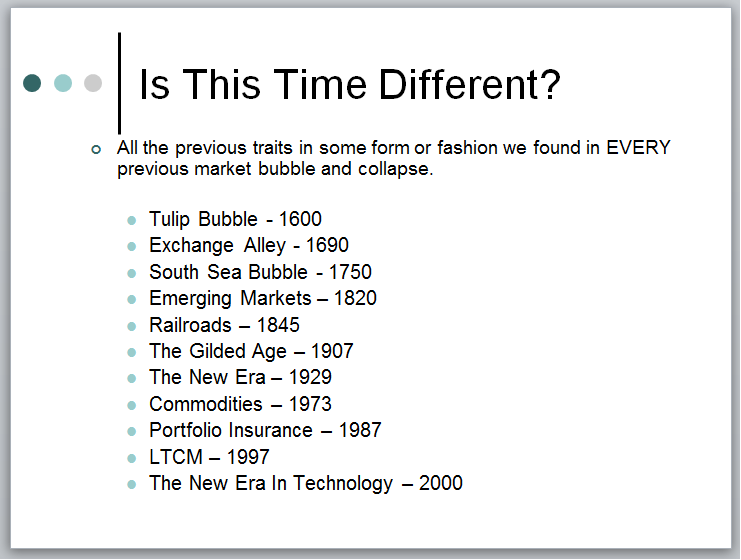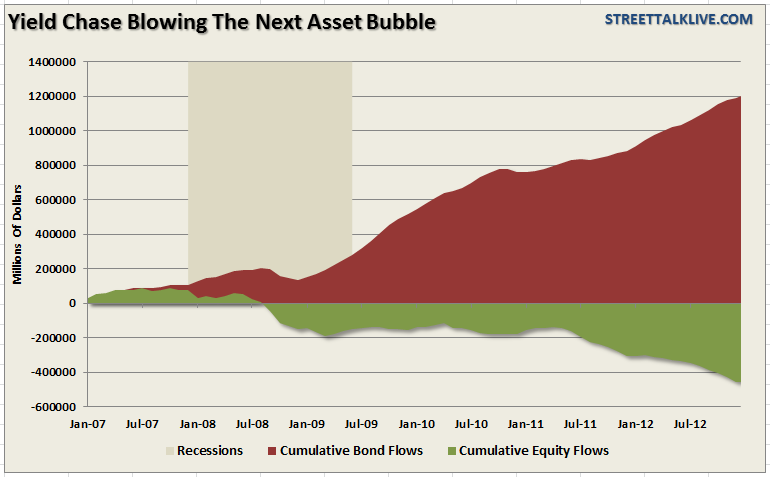There is no doubt that we are in the process of potentially creating one of the largest asset bubbles in history. While many financial analysts, asset managers and the overly optimistic media will rapidly disagree with that statement – it is important to note that none of the aforementioned experts have ever identified a bubble in advance. In fact, as we discussed last week, the backdrop of current optimism is far too reminiscent of previous points in history where bubbles were already well into formation.
However, the problem with bubbles is that they can last far longer, and rise farther, than most would generally think possible.
Every bubble has been driven by a couple of common factors: excess liquidity, “a new era” mentality and speculative frenzy. Each time the bubble is formed it is believed that “this time is different” for one reason or another. The slide below was from a presentation that I did in March of 2008 when I was calling for the bursting of the equity markets. No one believed me then because the markets were still surging higher as analysts, economists and the media were calling for “soft landing” scenario.
The last bubble was driven by a speculative frenzy in home ownership and the conversion of real estate into an ATM via mortgage equity withdrawals. As we all know now – that ended very badly.
The current bubble is different. It is being driven by a coordinated worldwide dump of liquidity into the financial system in order to suppress interest rates. The error in the current thinking is in the idea that this excess liquidity can be withdrawn from the system in advance of any systemic shock that might occur. Historically, that foresight has never been the case.
The chart shows the cumulative run of money flows into bonds since the end of the last recession. 
Over the last five years money has been poured into bond funds in the chase for yield. Primarily, those money flows have gone into “high yield” bond funds, which is a better marketing term than “junk bonds,” in search of a higher return on investment with a misdiagnosed belief that the principle is safe. When the next recession hits, and it is not a question of “if”, the loss of capital to investors will surpass any level seen in previous market crashes.
The Implications Of A Bond Bust
The really scary issue surrounding this particular bubble is that it is not just one asset class. Previously, it was the “tech bubble” which was a boom and bust in stocks. This was followed by the “real estate” bubble where money was extracted from real estate and shoved into equities. The collapse in real estate and stocks had a huge negative implication on household net worth.
However, in both previous cases money moved into bonds during the subsequent stock market crash, driving yields lower, as money ran for safety. The problem with the bubble that is currently being built in the bond market is that when it bursts it will have dramatic implications across the entire economic and financial spectrum.
Market analysts and managers have been stating that investors should come out of bonds and go into equities because the bond bubble has come to an end. They better hope that they are wrong. When the bond bubble ends this means that bonds will decline rapidly in price pushing interest rates markedly higher – think Spain or Itally. This is the worst thing that could possible happen.
1) The Federal Reserve has been buying bonds for the last 4 years in an attempt to push interest lowers to support the economy. The recovery in economic growth is still dependent on massive levels of domestic and global interventions. Sharply rising rates will immediately curtail that growth as rising borrowing costs slows consumption.
2) The Federal Reserve currently runs the world’s largest hedge fund with over $3 Trillion in assets. Long Term Capital Mgmt. which managed only $100 billion at the time nearly brought the economy to its knees when rising interest rates caused it to collapse. The Fed is 30x the size and growing.
3) Rising interest rates will immediately kill the housing market taking that small contribution to the economy away. People buy payments, not houses, and rising rates mean higher payments.
4) An increase in interest rates means higher borrowing costs which leads to lower profit margins for corporations. This will negatively impact the stock market.
5) One of the main arguments of stock bulls over the last 4 years has been the stocks are cheap based on low interest rates. When rates rise the market becomes overvalued very quickly.
6) The massive derivatives market will be negatively impacted leading to another potential credit crisis as interest rate spread derivatives go bust.
7) As rates increase so does the variable rate interest payments on credit cards. With the consumer are being impacted by stagnant wages and increased taxes higher credit payments will lead to a rapid contraction in income and rising defaults.
8) Rising defaults on debt service will negatively impact banks which are still not adequately capitalized and still burdened by large levels of bad debts.
9) Commodities, which are very sensitive to the direction and strength of the global economy, will plunge in price as recession sets in.
10) The deficit/GDP ratio will begin to soar as borrowing costs rise sharply. The many forecasts for lower future deficits will crumble as new forecasts begin to propel higher.
I could go on but you get the idea.
The problem with most of the forecasts for the end of the bond bubble is the assumption that we are only talking about the isolated case of a shifting of asset classes between stocks and bonds. However, the issue of rising borrowing costs spreads through the entire financial ecosystem like a virus. The rise and fall of stock prices has very little to do with the average American and their participation in the domestic economy. Interest rates, however, are an entirely different matter.
What would be required to diminish the impact of bursting bond market bubble is a slow, and controlled, unwinding of the bond market over a very long period of time. The Fed would to have step up interventions on a massive scale to offset the selling of bond market and curtail the rise in rates. Even with that I would expect a rather sharp economic deceleration as the housing market grinds to halt and overall consumption declines. The actual achievement of such a counter balance to a market as large as the bond market is difficult to fathom.
While I do not expect that the bond "bubble" will pop anytime soon, particularly as long as the Fed is continuing to artifical intervene to boost economic growth by suppressing interest rates, spotting the end of the "bubble" will be incredibly difficult. While logic will tell you that we are already well on our way to the next bubble the irrationality of market participants, combined with globally accomodative central bankers, can drive the current bubble to greater proportions than can be imagined. How it ends is only just a guess - but history tells us that such things rarely end well.
- English (UK)
- English (India)
- English (Canada)
- English (Australia)
- English (South Africa)
- English (Philippines)
- English (Nigeria)
- Deutsch
- Español (España)
- Español (México)
- Français
- Italiano
- Nederlands
- Português (Portugal)
- Polski
- Português (Brasil)
- Русский
- Türkçe
- العربية
- Ελληνικά
- Svenska
- Suomi
- עברית
- 日本語
- 한국어
- 简体中文
- 繁體中文
- Bahasa Indonesia
- Bahasa Melayu
- ไทย
- Tiếng Việt
- हिंदी
Pray The Bond Bubble Doesn't Pop
Published 01/22/2013, 01:36 AM
Updated 02/15/2024, 03:10 AM
Pray The Bond Bubble Doesn't Pop
Latest comments
Loading next article…
Install Our App
Risk Disclosure: Trading in financial instruments and/or cryptocurrencies involves high risks including the risk of losing some, or all, of your investment amount, and may not be suitable for all investors. Prices of cryptocurrencies are extremely volatile and may be affected by external factors such as financial, regulatory or political events. Trading on margin increases the financial risks.
Before deciding to trade in financial instrument or cryptocurrencies you should be fully informed of the risks and costs associated with trading the financial markets, carefully consider your investment objectives, level of experience, and risk appetite, and seek professional advice where needed.
Fusion Media would like to remind you that the data contained in this website is not necessarily real-time nor accurate. The data and prices on the website are not necessarily provided by any market or exchange, but may be provided by market makers, and so prices may not be accurate and may differ from the actual price at any given market, meaning prices are indicative and not appropriate for trading purposes. Fusion Media and any provider of the data contained in this website will not accept liability for any loss or damage as a result of your trading, or your reliance on the information contained within this website.
It is prohibited to use, store, reproduce, display, modify, transmit or distribute the data contained in this website without the explicit prior written permission of Fusion Media and/or the data provider. All intellectual property rights are reserved by the providers and/or the exchange providing the data contained in this website.
Fusion Media may be compensated by the advertisers that appear on the website, based on your interaction with the advertisements or advertisers.
Before deciding to trade in financial instrument or cryptocurrencies you should be fully informed of the risks and costs associated with trading the financial markets, carefully consider your investment objectives, level of experience, and risk appetite, and seek professional advice where needed.
Fusion Media would like to remind you that the data contained in this website is not necessarily real-time nor accurate. The data and prices on the website are not necessarily provided by any market or exchange, but may be provided by market makers, and so prices may not be accurate and may differ from the actual price at any given market, meaning prices are indicative and not appropriate for trading purposes. Fusion Media and any provider of the data contained in this website will not accept liability for any loss or damage as a result of your trading, or your reliance on the information contained within this website.
It is prohibited to use, store, reproduce, display, modify, transmit or distribute the data contained in this website without the explicit prior written permission of Fusion Media and/or the data provider. All intellectual property rights are reserved by the providers and/or the exchange providing the data contained in this website.
Fusion Media may be compensated by the advertisers that appear on the website, based on your interaction with the advertisements or advertisers.
© 2007-2024 - Fusion Media Limited. All Rights Reserved.
